Award-Winning Chicago Personal Injury Lawyer - Securing Justice
for Illinois Injury Victims - Over $450 Million Recovered
At Rosenfeld Injury Lawyers, our Chicago anesthesia error attorney team advocates for patients harmed by mistakes during medical procedures. We hold negligent medical professionals and facilities accountable for the damage caused. Our attorneys have the experience to handle these complex medical malpractice claims while providing dedicated support to families across Chicago and the surrounding communities.
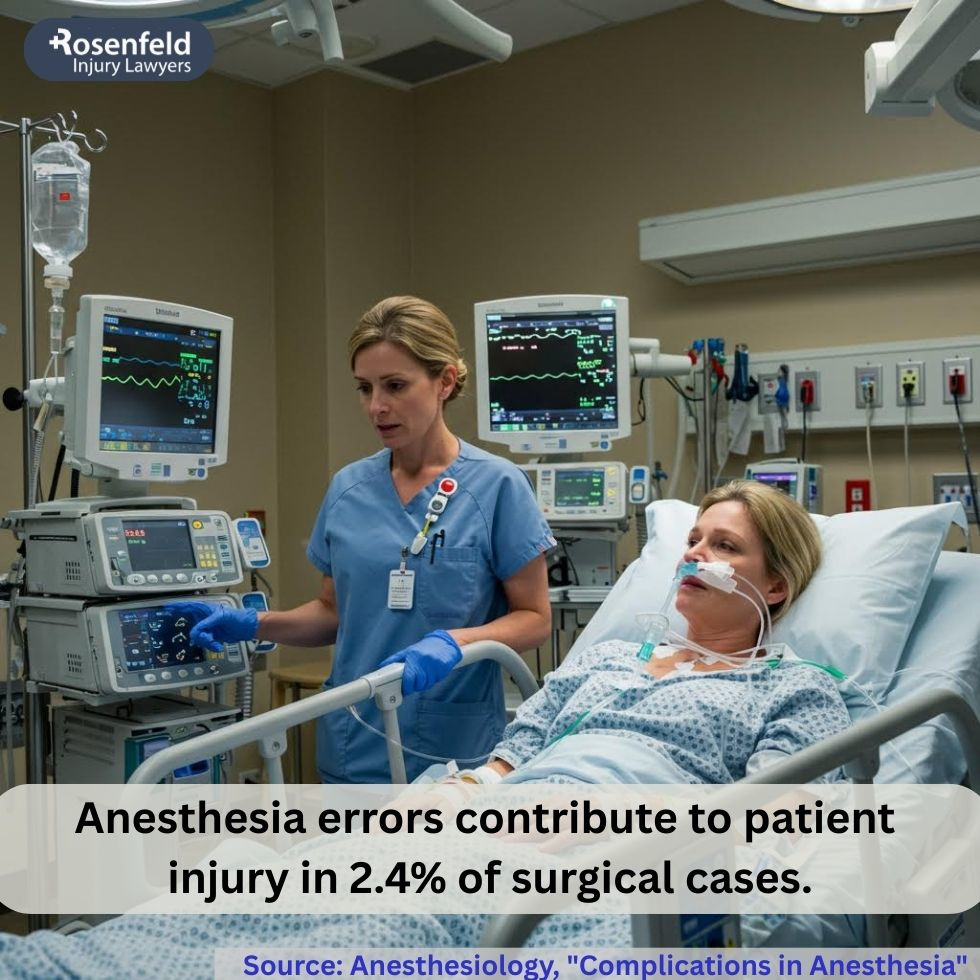
$4,250,000 Settlement – Marissa, a 46-year-old Chicago resident, suffered brain damage during a surgical procedure when an anesthesia machine malfunction went unnoticed by the medical staff. The error caused a prolonged drop in her oxygen levels, leading to cognitive impairment and the need for ongoing medical care.
As top-rated Chicago medical malpractice attorneys, Rosenfeld Injury Lawyers has secured over $450 million for clients in medical negligence cases, including those involving anesthesia. Our firm is recognized by Super Lawyers and the Million Dollar Advocates Forum for achieving exceptional results.
We combine deep knowledge of medical malpractice law with the resources needed to take on hospitals, surgical centers, and insurance companies. From investigating anesthesia machine operation failures to exposing human errors in administration, we fight to recover substantial compensation for our clients. To further support our clients, we offer a dedicated library of Medical Malpractice Resources that help victims understand the legal standards and procedural requirements of filing a claim in Illinois.
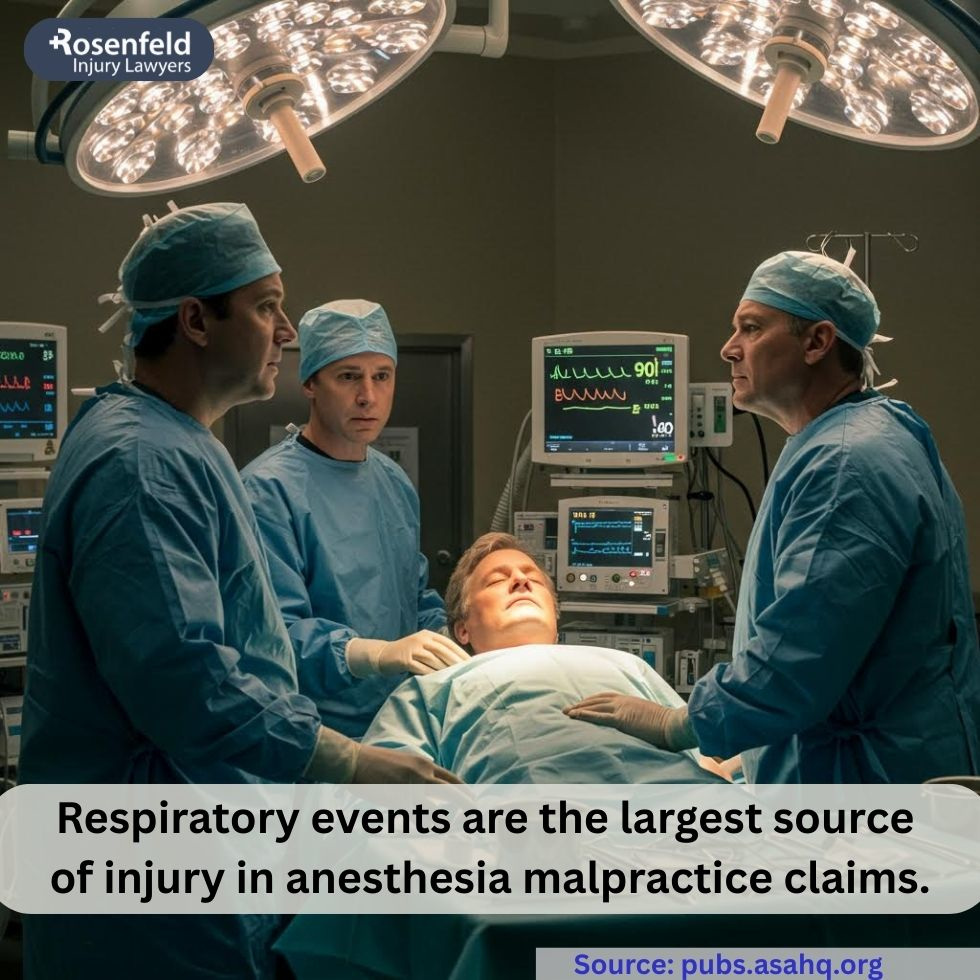
Our top-rated anesthesia error lawyers represent patients who have suffered serious injuries from a wide range of mistakes during medical procedures.
We handle general anesthesia errors, which can result in brain damage, cardiac arrest, or even wrongful death if airway management is mishandled or oxygen levels drop too low. Regional anesthesia errors, such as epidurals or spinal blocks, can cause nerve damage, spinal cord injuries, or paralysis when administered incorrectly. Local anesthesia complications may occur during dental work, minor surgical procedures, or outpatient treatments, sometimes leading to allergic reactions or toxic overdoses.
Improper monitoring during anesthesia is another common cause of injury, as failure to track a patient’s vital signs can result in preventable injuries. We also represent patients harmed by dosage errors, whether too much anesthesia, leading to dangerously low blood pressure, or too little anesthesia, causing the trauma of waking during surgery.
Additionally, we pursue claims involving failure to recognize complications or respond to adverse reactions or allergies, where prompt intervention could have prevented lasting harm. Our legal team includes a specialized Chicago Medication Error Lawyer to investigate pharmacy oversights, a Chicago Misdiagnosis Attorney for missed clinical warning signs, and a Chicago Stroke Misdiagnosis Lawyer for cases where failing to monitor blood pressure leads to preventable neurological trauma.
Anesthesia injuries often occur because medical professionals fail to follow established safety protocols during a medical procedure. One common cause is the failure to review a patient’s medical history and identify potential risk factors, such as allergies, pre-existing conditions, or interactions with other medications.
Inadequate monitoring of vital signs—including oxygen levels, heart rate, and blood pressure—can allow dangerous complications to go unnoticed until it’s too late. Administering incorrect dosages or the wrong medication can lead to anesthesia failure, brain injury, or cardiac arrest. Equipment malfunction, such as issues with anesthesia machine operation or improper maintenance of medical equipment, may also cause serious harm.
Finally, when medical staff fail to recognize or respond to signs of distress, the patient may suffer severe injury or death. Each of these errors can form the basis of medical malpractice lawsuits to recover compensation for injured patients. When these incidents occur alongside operative mistakes, we utilize a Chicago Surgical Error Lawyer to demonstrate how the combined negligence of the surgical and anesthesia teams led to catastrophic patient harm.
Anesthesia complications can cause life-altering or fatal injuries. Brain injury from oxygen deprivation may leave patients with permanent cognitive or physical impairments. Heart attacks or strokes can occur if anesthesia administration disrupts blood pressure or heart rhythm. Nerve injury or paralysis may result from improper regional anesthesia techniques, such as an epidural or spinal block.
Some patients experience anesthesia awareness, where they regain consciousness during surgery and endure severe psychological trauma. Allergic reactions or anaphylaxis can cause rapid, life-threatening distress if not treated immediately. In the most tragic cases, anesthesia errors lead to death, prompting a wrongful death lawsuit for surviving family members.
Victims of anesthesia errors in Chicago may be entitled to recover both economic and non-economic damages.
Economic damages cover the measurable financial losses a patient suffers due to anesthesia errors. They include current and future medical expenses, rehabilitation costs, and lost income or reduced earning capacity. These losses can be documented through bills, pay stubs, receipts, and expert financial projections.
Non-economic damages compensate for the personal, intangible effects of anesthesia injuries, losses without a direct dollar amount. They account for pain and suffering, emotional distress, loss of enjoyment of life, and loss of consortium. These damages reflect how the injury impacts daily living, relationships, and overall quality of life.
In cases of extreme negligence, reckless disregard for patient safety, or willful misconduct, punitive damages are awarded. Unlike economic or non-economic damages, their purpose is not to compensate the victim but to punish the wrongdoer and deter similar dangerous conduct in the future.
According to Law.com’s VerdictSearch, payouts in anesthesia error cases in Chicago range from $370,000 to $35,000,000. The average award is $7,883,897, with a median of $6,000,000.
Several factors influence the value of an anesthesia error lawsuit:
A skilled anesthesia error lawyer can assess these elements to seek the maximum possible recovery.
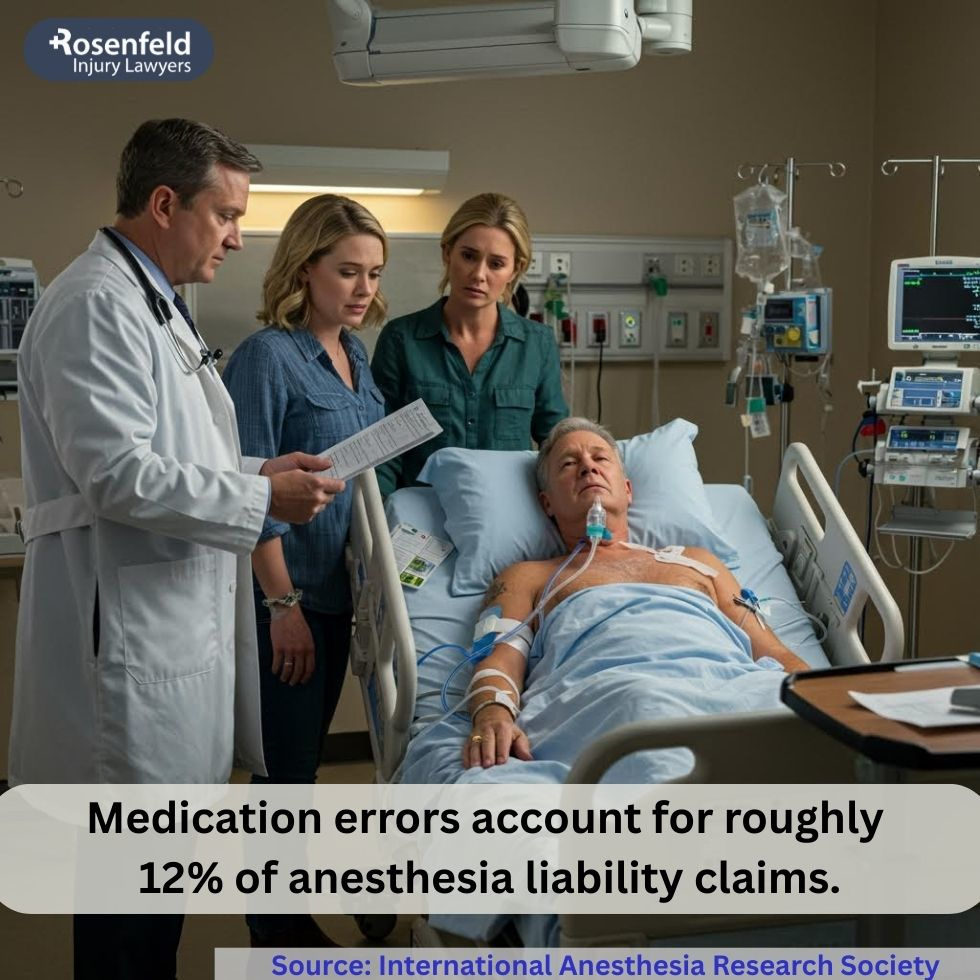
$35 Million Settlement – Intubation Failure During Appendectomy Causes Permanent Brain Injury
Neveen Morkos sustained severe brain injury after an unsecured intubation tube dislodged during emergency appendectomy anesthesia at Oak Forest Hospital. A 10-minute delay in reintubation deprived her of oxygen, causing lifelong disability. Although she regained some cognitive function, she remains unable to walk or talk and requires 24-hour care. The defense admitted liability before trial, and the case settled for $35 million, covering extensive future medical treatment expenses and non-economic damages.
$8.5 Million Verdict – Excessive Anesthetic Dosage Leads to Patient Death
Lowell Williamson died after receiving an excessive dose of Sevoflurane during shoulder surgery. The nurse anesthetist allegedly administered more than double the safe amount without proper supervision, causing hypotension, cardiac arrest, and brain injury. The attending anesthesiologist was absent for nearly an hour during the emergency. Williamson remained comatose until his death. The jury awarded $8.5 million in damages to his estate for wrongful death and loss of companionship.
$7.75 Million Verdict – Failure to Obtain Cardiac Clearance Before Surgery Causes Death
Jon Munden, a high-risk cardiac patient, died after cervical disc replacement surgery without the required cardiac clearance. His estate alleged multiple providers failed to postpone surgery despite abnormal test results. The jury found neurosurgeon Wesley Yapor negligent but cleared other defendants. Damages included pain and suffering, grief, and loss of society. The verdict totaled $7.75 million but was reduced to $5.75 million due to prior settlements with other defendants.
Anesthesia errors are among the most complex forms of medical malpractice, requiring both legal skill and medical insight. In Illinois, an expert affidavit is required before filing suit, so your attorney must work quickly to secure qualified medical specialists to review records and provide sworn opinions.
These cases often hinge on detailed analysis of hospital records, anesthesia logs, and patient vital sign charts to pinpoint errors. In Cook County courts—where many Chicago medical malpractice cases are filed—strict procedural rules and scheduling orders make it essential to have an anesthesia error lawyer who knows the local court system and how to counter the defense strategies hospitals and insurers rely on.
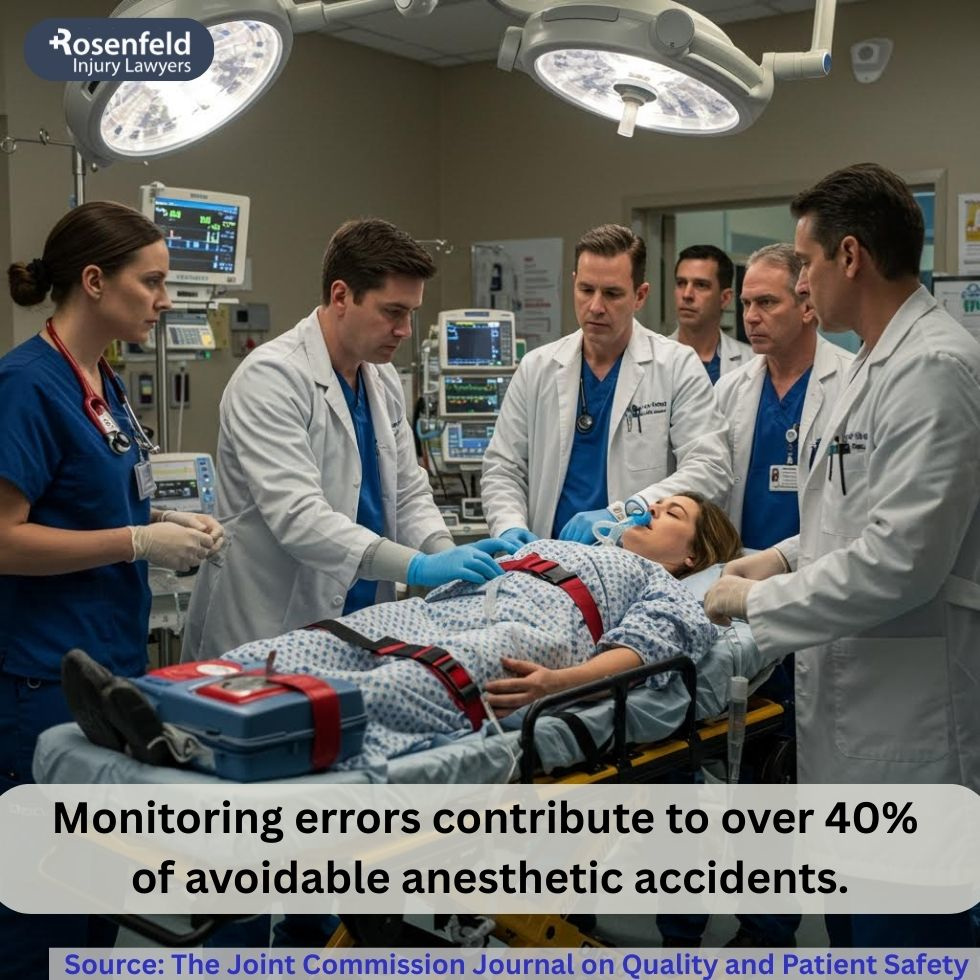
Anesthesia medical malpractice cases can occur in any setting where sedation or pain control is administered, but some environments present higher risks. In Chicago, most anesthesia malpractice claims stem from incidents in hospitals, particularly during complex surgical procedures at major institutions like Northwestern Memorial Hospital, Rush University Medical Center, and the University of Chicago Medical Center.
Ambulatory surgical centers, which often handle a high volume of same-day procedures, can also be sites of anesthesia mistakes, especially if staff overlook patient medical history or fail to monitor vital signs closely. Dental offices and oral surgery clinics present risks when sedation is administered without proper emergency protocols. Outpatient clinics, including gastroenterology centers performing endoscopies or colonoscopies, have also been linked to anesthesia complications.
Regardless of location, errors can stem from improper dosage, equipment malfunction, or failure to respond quickly to complications, making it critical that patients receive care from trained and attentive medical professionals.
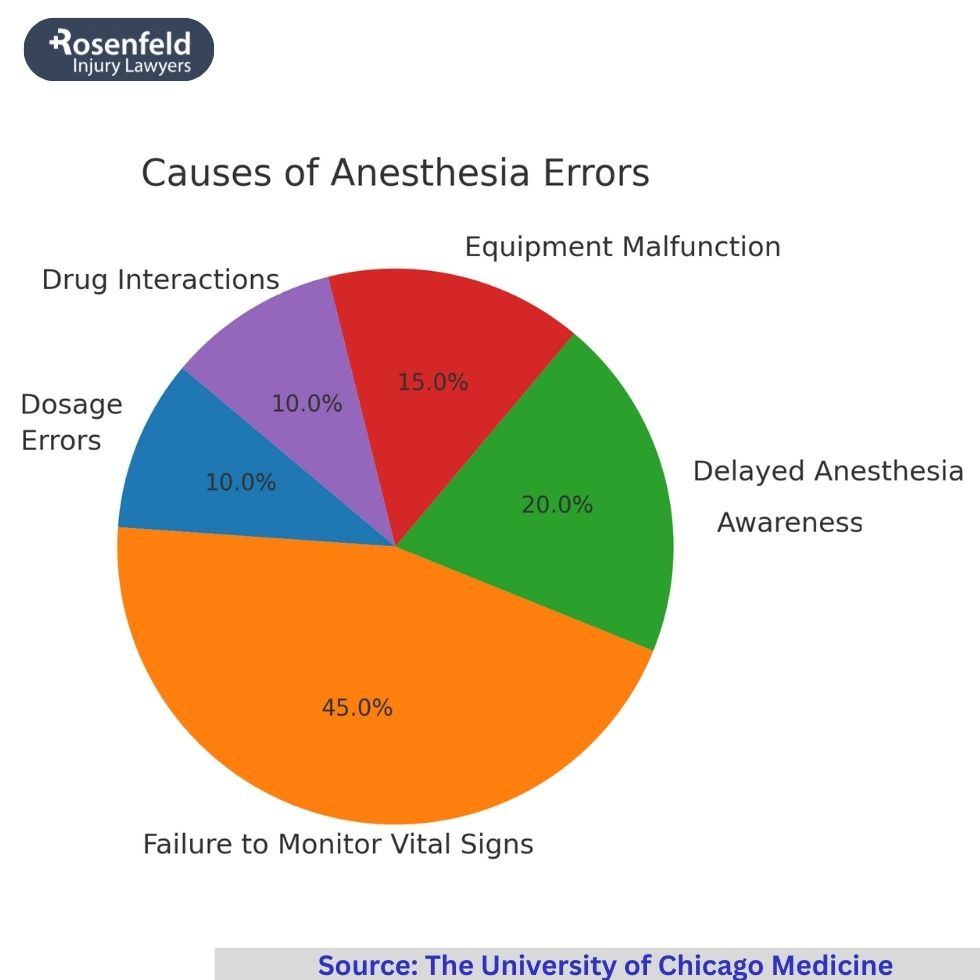
The Illinois Hospital Licensing Act (210 ILCS 85/) outlines hospital obligations to maintain safe anesthesia practices, including proper staffing, equipment maintenance, and monitoring protocols. It ensures Chicago hospitals follow strict standards to protect patients during administration, reducing risks of airway issues, oxygen deprivation, or other preventable anesthesia-related complications.
The Illinois Medical Practice Act (225 ILCS 60/) regulates the licensing and discipline of physicians, including anesthesiologists. It establishes professional standards for administration, airway management, and patient monitoring. Violations—such as incorrect dosages, delayed intervention, or failed intubation—can form the basis of a medical malpractice claim in Chicago.
The Illinois Nursing and Advanced Practice Nursing Act (225 ILCS 65/) governs the scope of practice for Certified Registered Nurse Anesthetists (CRNAs). It requires CRNAs to follow protocols for safe anesthesia delivery, including preoperative assessment, oxygenation monitoring, and responding to airway emergencies to prevent brain damage or death.
Section 14E-5-517 of Chicago’s Municipal Code imposes safety requirements for healthcare facilities, including infection control, equipment standards, and emergency preparedness. These provisions apply to hospitals, dental offices, and outpatient clinics where anesthesia is administered.
In Galich v. Advocate Health & Hospital Corp., 2024 IL App (1st) 230134, an ER physician’s failed intubation and ventilation attempts caused hypoxia and catastrophic brain injury. The First District upheld the plaintiff’s verdict, confirming that multiple negligence theories—such as airway mismanagement and oxygenation failures—may be presented to the jury in anesthesia-related malpractice cases.
Illinois’ Medical Malpractice Statute of Limitations (735 ILCS 5/13-212) requires most anesthesia malpractice lawsuits to be filed within two years of the date the injury was discovered—or reasonably should have been discovered—but no more than four years from the date of the malpractice. This “discovery rule” protects patients whose injuries were not immediately apparent.
If an anesthesia error results in death, the Wrongful Death Act (740 ILCS 180/) generally allows the estate to file suit within two years of the date of death. Damages may include loss of companionship, grief, and loss of financial support for surviving family members.
In Chicago, liability for anesthesia errors can fall on several parties depending on how the mistake occurred. Anesthesiologists and nurse anesthetists may be responsible for improper administration, failing to monitor vital signs, or not responding to complications. Surgeons can share liability if they pressured anesthesia staff to proceed unsafely or ignore patients’ warnings.
Hospitals and surgical centers may be accountable for inadequate staffing, poor training, or failing to follow safety protocols. In some cases, medical equipment manufacturers may be liable if a defect in an anesthesia machine or monitoring device contributed to the injury, triggering potential product liability claims.
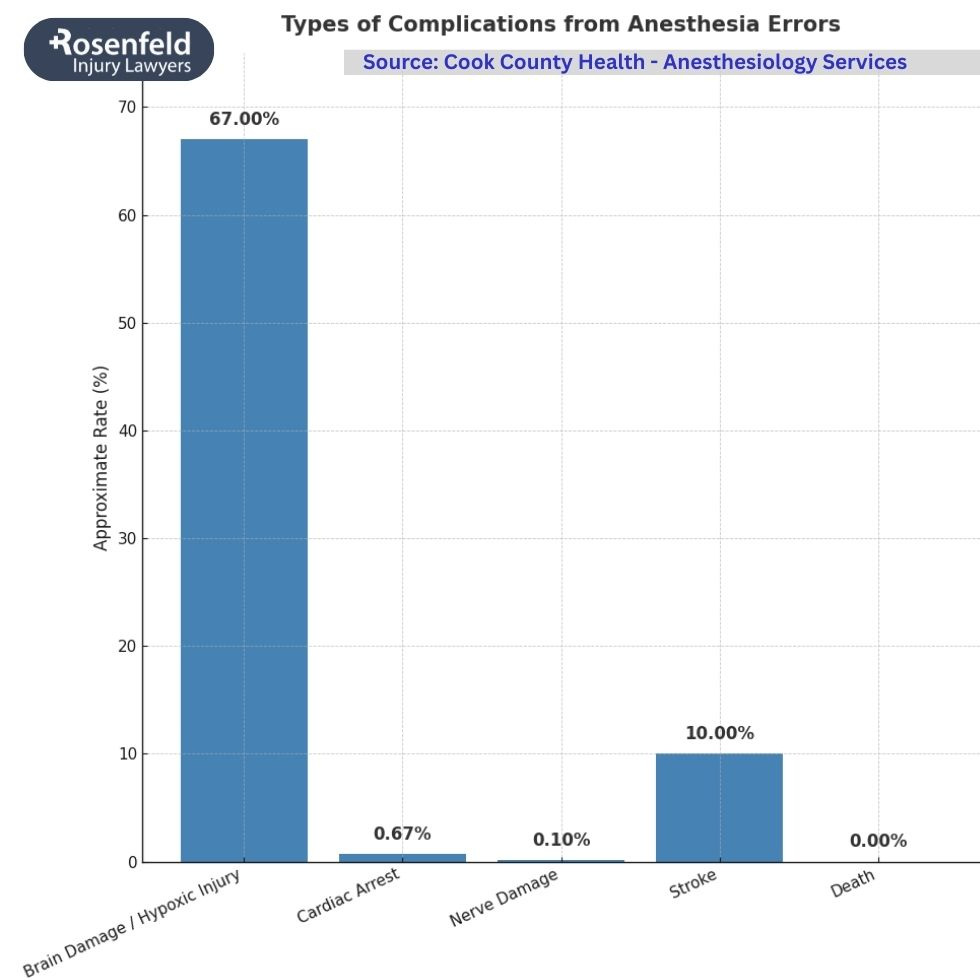
In anesthesia error lawsuits, defendants often argue that the patient’s injury resulted from an unforeseeable reaction to anesthesia rather than negligence. They may also claim that a pre-existing medical condition—such as heart disease or obesity—was the actual cause of harm. Another frequent defense is that the patient failed to disclose their complete medical history, including allergies, medications, or past complications, making it impossible to prevent the injury.
At Rosenfeld Injury Lawyers, we counter these arguments with comprehensive medical record reviews, consultations with board-certified anesthesia experts, and testimony that explains how proper protocols could have prevented the harm.
We also investigate hospital records, anesthesia machine logs, and witness statements to uncover procedural errors, poor monitoring, or delayed responses. By presenting clear, credible evidence, we focus the case on the provider’s negligence—not on factors outside the patient’s control.
To strengthen your anesthesia error case in Chicago, seek immediate medical attention and follow all treatment recommendations to protect your health and create a clear medical record of your injuries. Request and preserve all relevant medical records, including anesthesia charts, monitoring logs, and surgical notes, before they can be altered or misplaced.
Document any symptoms, pain, or changes in your condition with detailed notes or photos, as this evidence can help prove the extent of harm. Finally, do not speak with hospital risk managers or insurance representatives without legal counsel, as their goal is to minimize liability, not protect your rights.
A skilled anesthesia error lawyer can thoroughly investigate the incident, reviewing surgical records, anesthesia logs, and monitoring data to identify mistakes. We work closely with anesthesia and medical experts to analyze whether proper protocols were followed during anesthesia administration and monitoring.
Our team handles all communications with insurance companies, defense lawyers, and hospital representatives, ensuring nothing you say is used to reduce your claim. We also prepare, file, and litigate your anesthesia error lawsuit in court, advocating for the maximum financial recovery possible for medical bills, lost income, and pain and suffering, while protecting your rights every step of the way.
Administering too much anesthesia can cause dangerously low blood pressure, breathing problems, damage , or even death. If the overdose was due to negligence—such as incorrect dosage calculation, improper monitoring, or failure to respond to warning signs—you may have grounds for a medical malpractice claim.
If a preventable anesthesia error caused nerve damage, you may have a valid malpractice claim. Nerve injuries may result from improper positioning during surgery, incorrect needle placement during regional blocks, or prolonged compression due to inadequate monitoring. These injuries can cause pain, weakness, or permanent loss of function.
In Illinois, you can bring a wrongful death lawsuit if anesthesia malpractice caused a loved one’s death. Damages may include funeral expenses, loss of financial support, and compensation for grief and loss of companionship.
Hospitals can be liable for anesthesia mistakes caused by their employees, including anesthesiologists, nurse anesthetists, and surgical staff. Claims may involve negligent hiring, inadequate training, or failure to maintain safe anesthesia protocols. Hospitals are also responsible under “vicarious liability” when their staff cause patient harm within the scope of their duties.
Not every adverse anesthesia event qualifies as malpractice. Some complications occur despite proper care due to unavoidable patient-specific risks. To prove malpractice, you must show the provider deviated from the accepted standard of care and that this caused your injury.
In an Illinois anesthesia error lawsuit, you must prove four key elements. First is duty, meaning the provider had a legal responsibility to meet accepted standards of anesthesia care. Second is breach, which occurs when the provider fails to meet those standards. Third is causation, requiring proof that the breach directly led to your injury. Finally, you must show that you’ve suffered measurable harm, such as medical bills, lost income, or other damages.
The most frequent anesthesia-related malpractice claims involve airway management failures, including delayed or failed intubation, which can cause hypoxia and damage to the brain. Other common claims include improper anesthesia dosing, failure to monitor vital signs, and not recognizing or treating anesthesia-related complications promptly.
Anesthesiologists face malpractice lawsuits at a rate of about 11.7 claims per 100 physician-years, according to the American Society of Anesthesiologists. While most claims are resolved for lower amounts, roughly 10% of paid anesthesia malpractice claims exceed $1 million in compensation.
Our Chicago anesthesia error attorneys work on a contingency fee basis, meaning you pay nothing up front and only owe legal fees if we win your case. The fee is typically a percentage of your settlement or verdict.
Brain damage often results from oxygen deprivation (hypoxia) during surgery, which can occur if airway is obstructed, blood pressure drops too low, or the patient is improperly ventilated. The brain can suffer irreversible injury within minutes without oxygen. This may lead to long-term cognitive deficits, motor impairment, or even a persistent vegetative state.
Anesthesia awareness occurs when a patient becomes conscious during surgery despite receiving general anesthesia. Waking up during surgery can lead to extreme pain, panic, and lasting psychological trauma such as post-traumatic stress disorder (PTSD). If awareness results from medical negligence—such as improper dosing, faulty anesthesia equipment, or inadequate monitoring—you may have legal grounds to file an anesthesia error lawsuit.
In most surgeries, anesthesiologists or certified nurse anesthetists (CRNAs) are responsible for anesthesia administration and monitoring throughout the procedure. Continuous monitoring is critical to detect changes in vital signs or anesthesia depth. If the anesthesia provider leaves without proper coverage and a complication occurs, this may constitute negligence and form the basis of a malpractice claim.
The onset time depends on the type of anesthesia. General anesthesia typically works within 30 seconds to 2 minutes after intravenous administration, while inhalation agents may take a few minutes longer. Regional and local anesthesia onset varies from a few minutes to 20 minutes, depending on the drug and the location of injection. Proper monitoring during this period is essential to ensure the anesthesia is effective before surgery begins.
Duration depends on the drug type, dosage, patient’s metabolism, and overall health. General anesthetics may wear off within hours, but residual effects—such as grogginess, coordination problems, and memory issues—can last up to 24 hours. Older adults or patients with certain medical conditions may experience lingering effects for days.
No, but side effects are common. Temporary symptoms can include grogginess, nausea, sore throat, or chills. More serious complications are less common but require immediate medical attention. Certain factors, including age, the patient’s health conditions, and medication interactions, can increase risk.

If you or a loved one has suffered harm from an anesthesia error, the experienced team at Rosenfeld Injury Lawyers is here to help. Our Chicago personal injury lawyers have a proven record of holding negligent medical providers accountable and securing substantial compensation for injured patients and their families. Call us at (888) 424–5757 or fill out our contact form to schedule your free consultation and learn how we can help protect your rights and your future.
Specific Cases We Handle
Our downtown office, near the Richard J. Daley Center, Dirkson United States Courthouse, and the Chicago Workers’ Compensation Commission, offers convenient access from Aurora, Joliet, and Waukegan via I-90, I-94, and I-290.
225 W Wacker Dr #1660
Chicago, IL 60606
Phone: (847) 835-8895
Toll Free: (888) 424-5757
We also serve clients from Chicago, Elgin, Schaumburg, Rockford and throughout Illinois.
Resources: [1] Forbes, [2] Association of Anaesthetists, [3] British Journal of Anaesthesia, [4] National Library of Medicine, [5] The Doctors Company
All content undergoes thorough legal review by experienced attorneys, including Jonathan Rosenfeld. With 25 years of experience in personal injury law and over 100 years of combined legal expertise within our team, we ensure that every article is legally accurate, compliant, and reflects current legal standards.